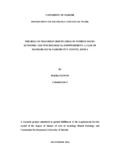| dc.description.abstract | Women empowerment and pushing for gender equality is one of the key elements to achieving sustainable development (World Bank, 2015). Participation in Self-help groups (SHGs) has played a great role to empower people, especially women and communities. Although the importance of the role of SHGs has been focused on improving the general lives of members, apparent there haven't been relevant studies about system and structures of SHGs. Past studies general focused on the economic impact of SHGs even though women empowerment are generally encompassed by social and psychological influences. Thus this study sought to identify the system and structures of SHGs, the economic, social and psychological impact of participation in these informal groups and the challenges of joining the SHGs. The study was carried out at Village II, Mathare that is one of the largest informal settlements in Nairobi, Kenya. Empowerment theory and symbolic interactionism theory were used for support the strength of the study. The study targeted 77 women aged 18 and above who are registered self help group members in Village II, Mathare. The non probability method that was used is snow ball sampling technique. Data was collected through focused group discussions, interviews and questionnaires. From the research findings it was concluded that participating in Self help groups plays animportant role in women empowerment. the Self help groups benefit women members economically, socially and psychologically. From the findings the study made the following recommendations; 1) the groups should have proper division of labour to ensure equal distribution of roles to all members and decision making should involve the whole group; 2) the Government should set aside funds for women through supporting SHGs by partially paying for the registration fee and even partially funding some of their income generating activities; 3) the government and other stakeholders should develop modules covering business, financial management to equip the women with skills necessary to accord them better opportunities at earning a better income. | en_US |



